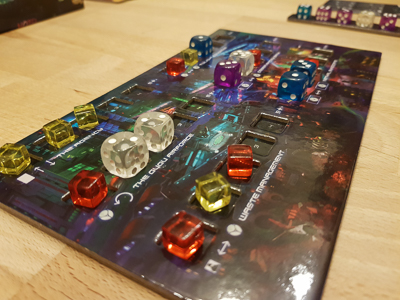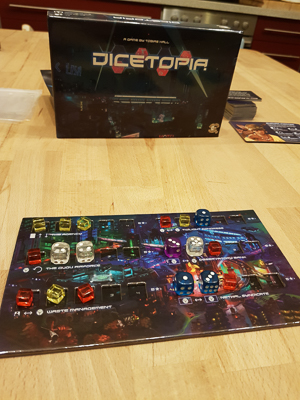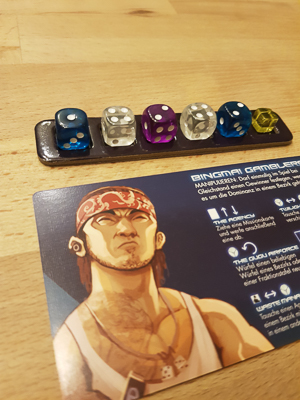

![[IMAGE]](../bilder/dicetopia1.jpg) |
Author: Publisher: No. of Players: |
![[IMAGE]](../technik/box/rot/rot-5.gif) ![[IMAGE]](../technik/box/gelb/gelb-8.gif) ![[IMAGE]](../technik/box/grun/grun-7.gif) ![[IMAGE]](../technik/box/pink/pink-6.gif) ![[IMAGE]](../technik/box/blau/blau-8.gif) |
|
G@mebox author Lutz Wildt writes about the game:
The City of Dicetopia is a seething cauldron of petty thieves, devious corporations and ruthless smugglers. The game that takes place in this city is a strategic boardgame for 2 – 4 players. It combines elements of area control, dice manipulation, worker placement, and secret objectives. The combination of these genres sounds too be a little strange and maybe even complex, but nevertheless the gameplay is quite easy. Players take turns by swapping one of their agents from their Faction Board with a die from the general City Board. Then they perform a corresponding action. The general City Board is divided into six different sections, called neighbourhoods, with spaces for five dice each. It is set up by a roll of 30 dice that are randomly placed on the free spaces of the board afterwards. Every player has six agents on his or her personal Faction board at the beginning of the game, thus the game ends after each player has exchanged these agents and ends with six dice on the Faction Board instead of the agents.
There are three ways to score: firstly, the players gain victory points at the end of the game equal to the total value of the dice placed on their Faction Boards (for that reason it is useful to choose dice with high values). Secondly, the player with the most agents in each of the six neighbourhoods receives a bonus of five victory points plus the number of dice remaining in the neighbourhood (so, players should also consider where to place their agents). And last but not least, players receive victory points from their secret mission cards (The quantity and wide variation of the aims of these cards makes it sometimes difficult to judge their true strength, especially if you are still unfamiliar with the game).
 So far, so good. But swapping agents with dice and counting victory points in the end, that´s all? Of course it is not. The crucial factor of the game is the deployment of the neighbourhood actions and the abilities of the different factions in the neighbourhood. By using the neighbourhood action, the players can manipulate the dice and agents by swapping them between the neighbourhoods and/or the Faction Board, or for example they are allowed to reroll certain dice every time an agent is swapped. Furthermore, some actions make it possible to substitute a mission card. Of course, the unique faction abilities override the normal game rules. And although they can often be used only once per game, they are a mighty weapon. Sometimes they help the player enourmously by changing the value of a die by +1 or -1, for example. On the other hand, they can influence the action of an opponent by forcing him to choose a specific neighbourhood. I played Dicetopia with various groups and with different numbers of players. Common to all games was that the gameplay changed within the game flow. In the first phase of the game players normally are busy to regulate their own objectives, but when the game moves on, the opponent's goals might become obvious. At this moment a player has to decide if he wants to destroy the achievements of the other players, or if it is better to keep on building up his own faction board. This is aggravated by the fact that one never can be sure if the other players truly have revealed which target they are really heading for!  In my opinion Tabias Hall, the author of the game, has designed a multi-layered debut game in which the combination of the individual mechanics are well thought out. When you play the game for the first time, you quickly understand how the game works. However it might be frustrating that you still don't seem to know how to win the game, because you can't see all the opportunities that this small but nice game offers. But already after the first or second round you shoulf find a way to reach your goals. It may be too late for the first game, but a second game is quickly set up! To my mind, this is exactly what makes Dicetopia so replayable. There are a lot of different factions and even more missions with very different goals to reach. For example, sometimes you get a certain number of victory points for the dice of a given color, or you have to collect only odd dice on your faction board. In addition, experienced players can use another interesting element of the game. A stack of scenario cards is included with the game. These cards offer various rule changes and alternative setups that greatly change the gameplay and provide a more complex game experience. In one scenario, for example, the 30 dice are not rolled at the beginning of the game, but all dice during setup are turned to one. All mission cards that reward dice with one are removed from the game, and in addition to a Neighbourhood Action, players may re-roll any die on the city map. As you can easily see, in this scenario the game will take a completely different course and the players will have to change their tactics significantly.  Another plus for the game to my taste is the extraordinary and neon-coloured dystopic presentation, because it arouses the interest of potential players already after a first glimpse and the very first explanations of the rules. So, I think that I can often use Dicetopia as a filler or final game in the future, after all it only takes about 30 minutes. Thumbs up for Dicetopia. Can´t wait to play the game with some bluffing and devious opponents again. | ||
|
| ||

|
|

|
|
| ||
|
Impressum / Contact Info / Disclaimer Kulkmann@aol.com
Copyright © 2018 Ralf Togler & Frank Schulte-Kulkmann, Essen, Germany | ||